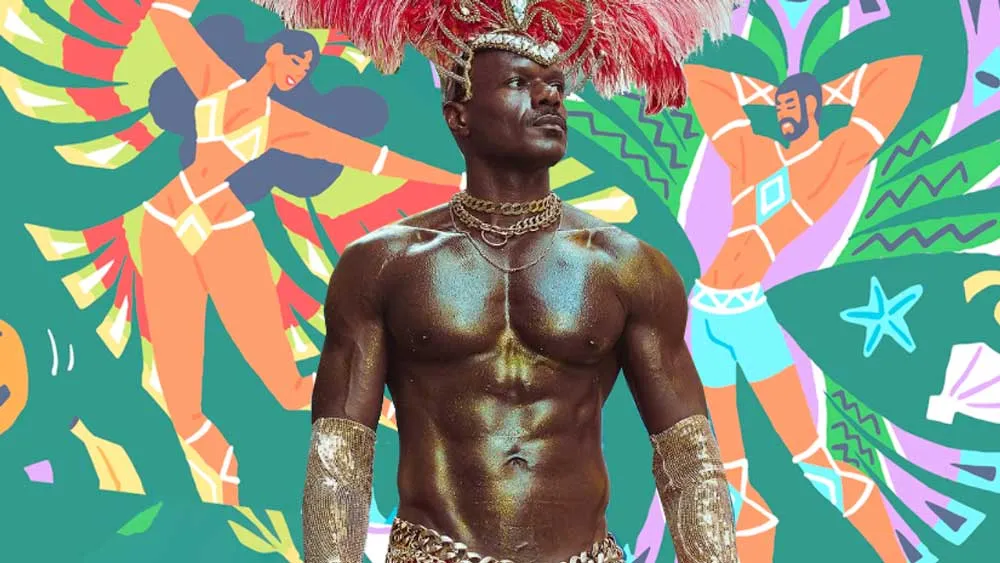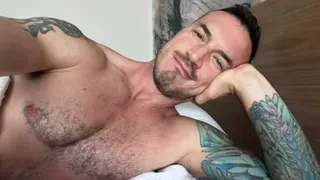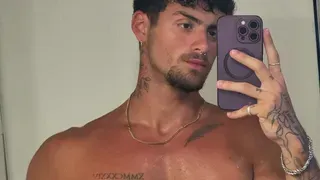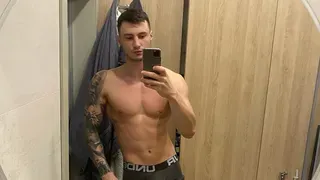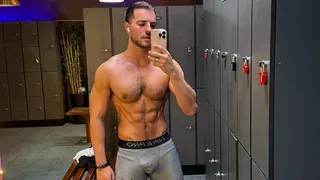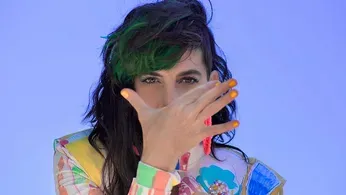
Jan 30
It Ain't Easy Being a 'Bad-Assed' Woman Who Calls Herself That B-Word
Nicholas Dussault READ TIME: 11 MIN.
When I met Bitch, she had neon green bangs, bright green eye shadow that perfectly complemented her hair, eyes that sparkled, a warm smile, and huge earrings that shook every time she laughed the most contagious laugh I've ever heard. Hardly what I was expecting from a queer music icon with a name like that!
Turns out she hasn't always been like this. Over the course of a conversation about her music career, her ninth album, "Bitchcraft," and her upcoming autobiographical play "B*ITCHCRAFT: A Musical Play," the queer icon revealed little factoids sure to make you want to know more. She was a tap dancer, a theater major, and never thought that her first music duo, Bitch and Animal, was a band. And she's had some struggles.
When pressed for more information about her struggles, her answer is an enthusiastic one that would make one of her heroes, Joan Rivers, proud: "You have to come see the play!" The Off-Broadway play promises songs and stories about the life of a young Bitch who overcame some major obstacles to become the best Bitch ever. And, yes, she promises some tap dancing; not necessarily good tap dancing, but she will dance.
Recently EDGE had the chance to chat, and laugh, with Bitch as she prepares for her Off-Broadway debut in "B*TCHCRAFT: A Musical Play," which opens February 7 and runs through March 1 at the Wild Project, 195 East 3rd Street, New York, New York. For further information, follow this link.
Watch the video for "Easy Target" from Bitch's album "Bitchcraft."
EDGE: Does your mother call you Bitch?
Bitch: (Laughs) No. She does though when we're at shows. She knows how to code switch. For years joked I was 10&1/2 pounds when I was born so I came by my name honestly. The irony is that my parents named me Karen. So there you go, I'm ahead of my time and now I've got to reclaim the Karen too. It's exhausting.
EDGE: It can't be easy being Bitch.
Bitch: No, not 24/7.
EDGE: So how did you end up being Bitch?
Bitch: I met Animal, my first band mate, in college. And while in a mushroom-induced feminist revelation we decided to take on these names. I was just coming into my own, feminist awakenings, total rage and rebellion as we all do in our young 20s. Bitch is like reclaiming this word that's generally used to insult powerful, badass women who take up space. I was all for wearing that like a costume. And it stuck.
EDGE: Do your friends call you Bitch?
Bitch: Animal and I moved to New York in '96 and all of my friends there call me Bitch. Some people call me B because they can't do the Bitch thing. But the only people who still call me Karen are people from high school, elementary school, that kind of thing. For a really long time I hid my secret identity from Wikipedia, Facebook and all of them. They didn't know my legal name, but eventually it got exposed through a Facebook kerfuffle.
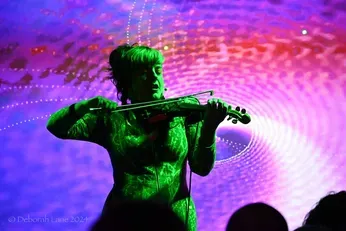
Source: Deborah Lane
EDGE: Do you ever get any blowback from your name?
Bitch: Some people have a really hard time embracing it. I understand and I have figured out my ways of disarming people because I'm not trying to retraumatize anyone. People have been traumatized in very real ways. Our friend, our enemy Mark Zuckerberg has been such a nightmare as Facebook algorithms have gotten smarter. They see the word as hate speech. When I put out my album I couldn't advertise anything in the metaverse. And yet, weirdly, in this new universe, I just texted my social media person this morning to see if Zuckerberg taking down the hate speech is going to be good for me.
I say this in an old version of the play, "You can say bitch all you want on TV, as long as you're insulting women. And then as soon as a feminist artist tries to take the tool of her oppression and turn it into the sound of her own liberation, she gets silenced." It's just classic.
EDGE: How did you go from being Karen from the suburbs of Michigan to Bitch, the indie musician?
Bitch: I was originally from the suburbs of Philadelphia, but we moved to Michigan when I was 11. I identify as being from Michigan and it's where the play is set. You have to come see the play. At least I hope you're going to come see it.
EDGE: Bitch please, I wouldn't miss it.
Bitch: Good! So I had played violin my entire life. When Animal and I met in acting school we started making music together. But we kind of thought of it as feminist theater. We were actors, thespians. We played one gig in Chicago after we graduated and we felt like we were on to something based on how people looked at us when we left the show. I literally quit my job the next day and we immediately moved to New York where we started the hustle. After a couple of years I invited some crazy person to live with us for free and she took over our lives. So we left her the lease and took off to Provincetown for the summer to play music. Ani DiFranco heard us and took us on tour. That launched our career. I've been doing it ever since.
EDGE: Would you call yourself a musician now?
Bitch: I remember the first time Animal and I got a piece of press when we were on tour with Ani. They called us a band, but we never thought of ourselves as that. We were doing performance art. But so much is about what other people say about you. I've always considered myself an artist, a performing artist, but I guess I was in the indie scene, though not quite rock. Animal and I were more in the folk world because we were touring with Ani a lot, but we never quite fit in no matter what genre we were placed in. We were always kind of the odd kids. And as you get older you appreciate that. I'm so fucking weird and I don't even care. It's so liberating.
EDGE: Why did you leave New York?
Bitch: I went through a very hard time in my career, which I go into in the play. It became hard to survive there. I was in a very stressful situation. My partner at the time had a log cabin in the middle of nowhere in Michigan and one day we just headed there. I didn't even tell anybody in New York. People would call and ask, "Hey what are you doing Tuesday?" and I'd say, "I won't be there." It took years for me to say that I actually left.
EDGE: Were you doing music in Michigan?
Bitch: I was there for three years and I was writing these songs; but I was in a hard place, not creatively, but in my outward facing life. When I was making "Bitchcraft" I thought I might just be making this for me and the squirrels.
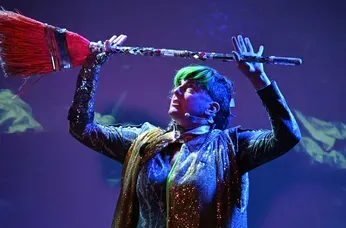
Source: Deborah Lane
EDGE: Were you alone in the cabin?
Bitch: No, I was with my partner. My God it would have been awful if I was alone at the time. I was living with this trans man that I was with for a decade. Eventually we moved to LA together, you know, the sunny borough. I was talking to my old manager about maybe doing a Bitch & Animal reunion and she asked me what I was working on. I played her one of the songs and she said, "You've got to put this out." We played it for (independent record label) Kill Rock Stars and it became this thing that people were excited about.
EDGE: I want to hear all about B*TCHCRAFT: A Musical Playt, but let's start with the album.
Bitch: The album came first. It might sound funny, but it's my 9th album and I had always approached everything from the point of the show, the live experience. This was the first time I really realized that this is the thing that lasts. I took my time and put everything into it. I was moving in a more pop direction and knew I wanted to go further that way. I started working with some trusted collaborators and made "Bitchcraft" in order to show myself the biggest side of myself that I could be. I feel very proud of it. I wanted to center my violin because my violin is my earliest voice. There's a lot of violin in it. It's an electric violin so it can sound like a guitar, but there's no guitar on the whole album.
The album cover has this queen's collar that my friend Dusty made out of a broom. When I started making videos I knew I had chosen the broom as my new symbol of power. In this way it's a witch reference, but it's also something about women's work. Women's work is generally free labor and I wanted to honor it because, generally, that kind of labor is the most important labor. Who can survive without somebody making soup or sweeping the floors, the basic necessities of life? I wanted to honor it so I had a friend make me a bedazzled broom and it's becoming this symbol for me. And I knew I wanted the broom in every video. I took my time and paid attention to the visuals, which in our modern day are so important. If I'm discovering a new artist I love to watch their videos because I get a sense of them and what their aesthetic is.
That's "Bitchcraft," the album. The label that I worked with when I first went solo, Kill Rock Stars, came back to me and said they're loving this new direction. They heard two songs and said, "Finish the album. We want to put it out." And oh my God, I feel like I haven't stopped running ever since!
EDGE: That's not a bad thing.
Bitch: No, it's been wonderful. I opened for the Indigo Girls a few times. They've been huge supporters of this record. Amy Ray said such nice things. She told me she was building a tree house and listened to it non-stop the entire time.
EDGE: Wow, that's pretty cool.
Bitch: I know. I love to say, "An Indigo Girl listened to my album while building her tree house!" They're so great.
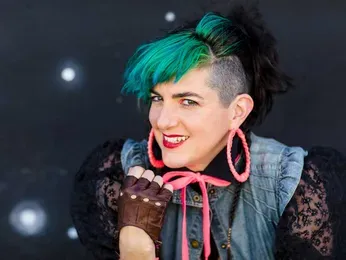
Source: Dana Lynn Pleasent
EDGE: How did the play come about?
Bitch: My partner Faith Soloway, who's also a theater person, musician and composer, knew I was about to go on tour and knew that I wanted to figure out how to put my story into a bigger context. They knew I had this hard period in my career and some of my most uber-fans didn't even know I was going through this thing. I've always had very theatrical shows, but wanted to take it up a notch, have some storytelling. I wanted to go on tour and put my story in a bigger context. I thought if I wrote a memoir, that would satisfy me, having some way of documenting my life.
Faith has this former collaborator, Margie Zohn, whose gift is working with artists on memoir stuff. She has this ability to help artists draw out their story. We started working together and I said, "I've got a 30-minute set. Let's start crafting something." I knew I wanted the broom involved. I knew I wanted to cast a spell in the very opening and to tell a story about a young Bitch. We wove stories into the set and I remember driving to the show thinking, "Am I really going to stand and do a monologue like I'm in high school theater camp? Put on your black turtleneck and stare off into space." I called Margie agonizing and she said, "Yes, you are."
I did it, and it crushed. It just started working. When the album was coming out I was going on a national tour so we developed the show into an hour-and-15. I carried my props around to rock clubs across America and did a kind of rock and roll version of this story that you'll see. And it took on a life of its own. People really resonated with it and now it has snowballed into five nights a week, Off-Broadway. I joined the Y and I'm doing sit-ups every day.
EDGE: I could talk to you all day, but you've got to get to the Y. One more thing. Tell me about your Patreon page.
Bitch: I love that you found my Patreon page. Do you know about Patreon?
EDGE: No, I'd never heard of it.
Bitch: It's a platform for artists. It's sort of like a fan club. I call them my Matrons. I post exclusive content over there. We do things like once a month I do a little hangout with my Matrons and I'll read to them from one of my journals or play them a new song. This last time was right after the election so we all did a little bit of sharing about it. We did a little bit of spell casting. It's been special to just connect. In my younger life I was way more distant with my supporters and fans. As I age I get more confident. It's hard to describe but it's been very healing for me to open myself up to people who love me. Why would I ever put a wall up?
And that's what's been so healing about writing this play too, because it is very vulnerable. I actually did a version of it this summer in Provincetown. I had to remind myself that it's a lot like doing feminist performance art. You're talking about your wounds, being vulnerable. It's so healing for me to do this play and share harder moments or more vulnerable moments and still feel like nobody's like avoiding eye contact with me after the show. In fact, I've had a lot of big feedback from women saying it's inspiring, it has helped them feel like they could take up more space in the world. I have surely felt a resonance there.
EDGE: One more thing, I promise. Is there anyone in the music world you'd like to meet?
Bitch: I would love to meet Taylor Swift. I would, of course, like to have a drink with Joni Mitchell. And I'd like to meet Chappell Roan. She feels a bit like a young version of me. And, oh yeah, if I can hang out with only one person, it would be Tracy Chapman.
